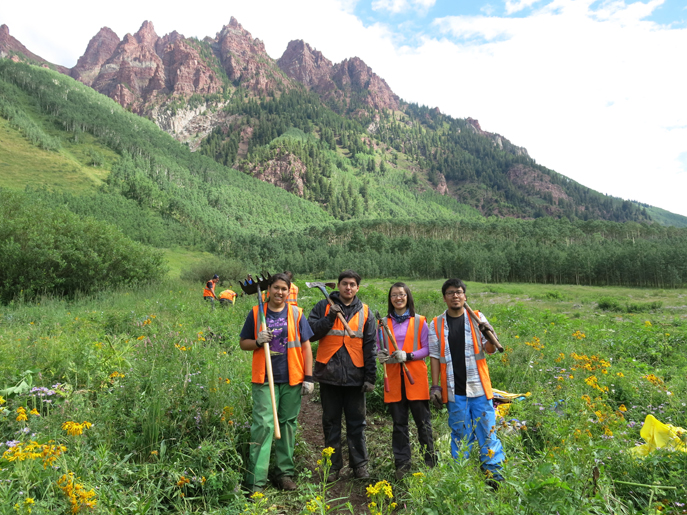
Angeles Chapter ICO chair Nancy Le (second from right) on an ICO service outing in Aspen, Colorado.
Inspiring Connections Outdoors (ICO) is a Sierra Club program dedicated to providing mostly urban youth from traditionally underserved communities with wilderness and out-of-doors experiences. It promotes the goals of lifelong health and appreciation for the environment through outdoor excursions. The Planet spoke with Nancy Le, chair of the Angeles Chapter ICO, about her involvement with the program.
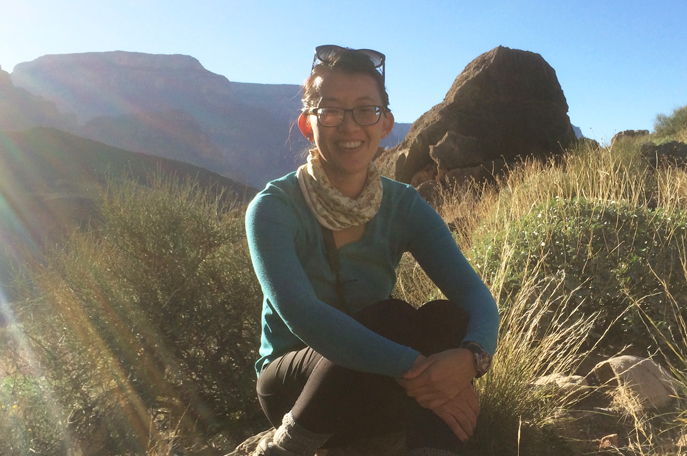
Nancy Le in the Grand Canyon.
Planet: Where did you grow up?
Le: In the San Fernando Valley of Los Angeles.
Planet: How did you first get involved with the Sierra Club and the ICO program?
Le: I had a friend who was pretty outdoorsy and we went camping together -- she’s the one who introduced me to the Sierra Club and ICO nearly ten years ago. I was a school teacher, and I wanted to take my students hiking. Several of my students went on ICO trips and enjoyed the experience, so I began leading ICO trips myself.
Planet: What are some of the challenges you’ve encountered running a program like this?
Le: Funding is the number one issue. We pay for the buses to our trips, our food, and camping fees, so we’re always writing grants and doing fundraising events. Another challenge is recruiting a diverse range of leaders, including age diversity. A lot of the leaders tend to be older, which can create a disconnect with student participants.
Los Angeles ICO focuses primarily on students from low-income communities; our student population tends to be predominantly African-American or Latino. Most of our volunteer leaders are not of Latino or African American descent, which can make it hard for the students to connect with the outdoors when they don’t see people who look like them or come from low-income communities represented sufficiently among ICO leaders.
Planet: How do you attract new ICO participants?
Le: Several ways. A lot of students do Google searches and come across our website. We occasionally post something in the Los Angeles Teachers Union newsletter, so teachers read about the Sierra Club and the ICO program and then reach out to us. And a lot of it is word of mouth from people who know someone in ICO, are intrigued by what they hear, and call us or email us to find out more.
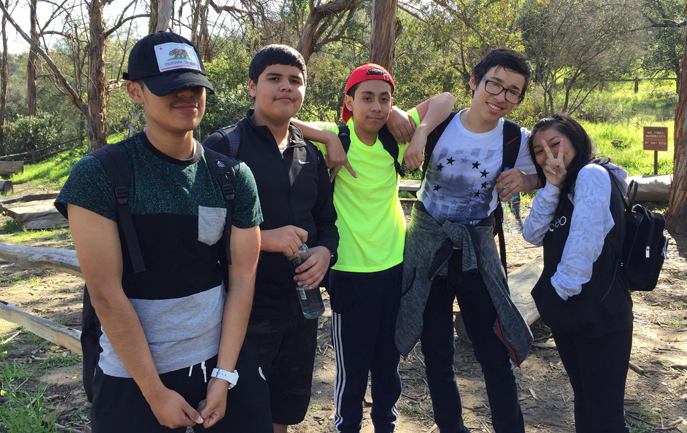
ICO trip to Malibu Creek State Park.
Planet: What do you tell teachers when you pitch them on ICO?
Le: We tell them that we organize hikes for kids, we provide the necessary gear and equipment, and we provide transportation, usually a bus, to take participants to the trailhead or whatever the destination of the outing may be. Providing buses is key because they’re expensive, and a lot of schools don’t have funding for transportation to get kids out into the wilderness, or even to what we like to call nearby nature. The fact that we’re able to provide transportation is a big lure.
Planet: Along those lines, what are some of the challenges you face getting kids outdoors in L.A.?
Le: Again, the biggest challenge really is transportation. Depending on where kids live, the destination might be an hour or more away, and a lot of the open space in the L.A. area isn’t well-served by public transit, so you definitely need a car or a bus to get there. Public transportation runs to some of the more urban outdoor spaces, but not ones farther out. ICO provides this access.
Planet: Why do you think it's important for kids to spend time outdoors and become comfortable in nature?
Le: Loads of reasons. Spending time outdoors is good for one’s physical health, of course, but also one’s mental health -- a lot of people feel getting outdoors and into nature helps them emotionally. It gets you out into fresh air, it helps to fight obesity, and it encourages a more healthy lifestyle through walking and being active. It’s also really important that kids learn to care about nature and develop an environmental awareness about things like the human impact on climate change. It’s harder to develop that awareness if you don’t get outdoors and make that direct connection to nature.
Planet: Have you seen ICO make a difference in kids' lives? What do you think ICO participants learn beyond the nuts & bolts of camping & backpacking?
Le: Believe it or not, a lot of kids in L.A. have never been to the beach, which is kind of shocking because it’s often within half an hour of where they live. So many kids never get out of the urban environment -- many hardly ever get more than15 or 20 minutes from the block where they live. We try to open their doors and broaden their perspective a little bit, get them to see the larger city, or different parts of Los Angeles that maybe they wouldn’t otherwise have the chance to see. It also provides networking opportunities. Participants meet like-minded people through the program -- both other students who share their interests, and adults who can mentor or guide them and sometimes hook them up with internships or other opportunities.
Planet: What have you gotten out of being an ICO leader?
Le: As a teacher, taking my students out on hikes gave me a way to connect with them in a non-academic setting. I think that’s why a lot of teachers get involved. And volunteers enjoy being involved with ICO because it offers them the chance to do something good for the community and share something they are passionate about with others.
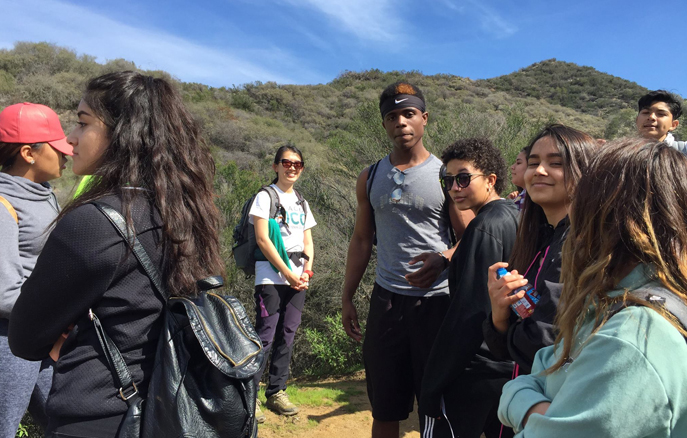
Angeles Chapter ICO trip (Nancy Le at center in back).
Planet: Do you ever collaborate with other community partners?
Le: We’ve worked with about 50 different schools, mostly K-12 schools, and a few churches and after-school programs. Sometimes when we have an outing to a place where there’s a nature center, we’ll partner with the docents there, who will often lead the students on a hike or give a talk at the nature center. I think both the students and the leaders learn a lot from those trips because we learn from people with intimate knowledge about natural areas that we’re not necessarily familiar with.
Planet: Can you elaborate a little on how ICO partners with public schools in L.A.?
Le: Sure. For one thing, it’s a lot of easier when we have a teacher liaison from a school because, really, the people who know the students best are the teachers. They’re the ones who honestly have the most influence on the students because they see them on a daily basis. It’s hard to imagine partnering with a school where we don’t have a relationship with the teachers. The students usually decide to go on an ICO trip because of their teacher. Often teachers are very keen to get their students outdoors, but they don’t have the knowledge or resources to lead a hike. We help supply those things. The teachers provide the relationship with the students, and ICO provides the knowledge about hiking, camping, the destination, the trail, and so forth, which helps the kids feel at ease getting out in nature.
Planet: ICO works with many communities that have historically lacked access to nature and the outdoors. How have you addressed this?
Le: Most of our students come from lower-income communities of color, while our leaders tend to be middle class and identify as white. We make a conscious, concerted effort to recruit more leaders of color who come from the same communities as the students. That can be hard, though, especially when the people we’re trying to recruit don’t have easy access to nature themselves, or very much experience in the out-of-doors. Recruitment is definitely something we need help with. We’re trying to develop a new leadership program, where we’re developing leadership skills within the ranks of our student participants. Our hope is that as these students get older, they’ll return and become an adult ICO leader, or maybe take on other leadership roles in their own community.
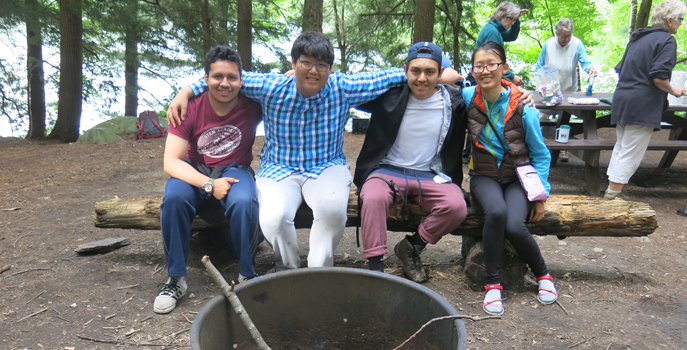
Angeles Chapter ICO service trip to Vermont.
Planet: What advice would you relay to other ICO leaders?
Le: One thing that helps an ICO program be successful is recognizing and tapping the strengths that different volunteers bring to the table. For example, one of our current volunteers has a background in event planning, and when she first started volunteering for us, she organized a adventure film festival fundraiser which was a big success precisely because of her event-planning skills. So try to figure out what people are really good at and how to best utilize and deploy those talents.
###
Learn more about Inspiring Connections Outdoors and get involved with an ICO group near you – or start your own!